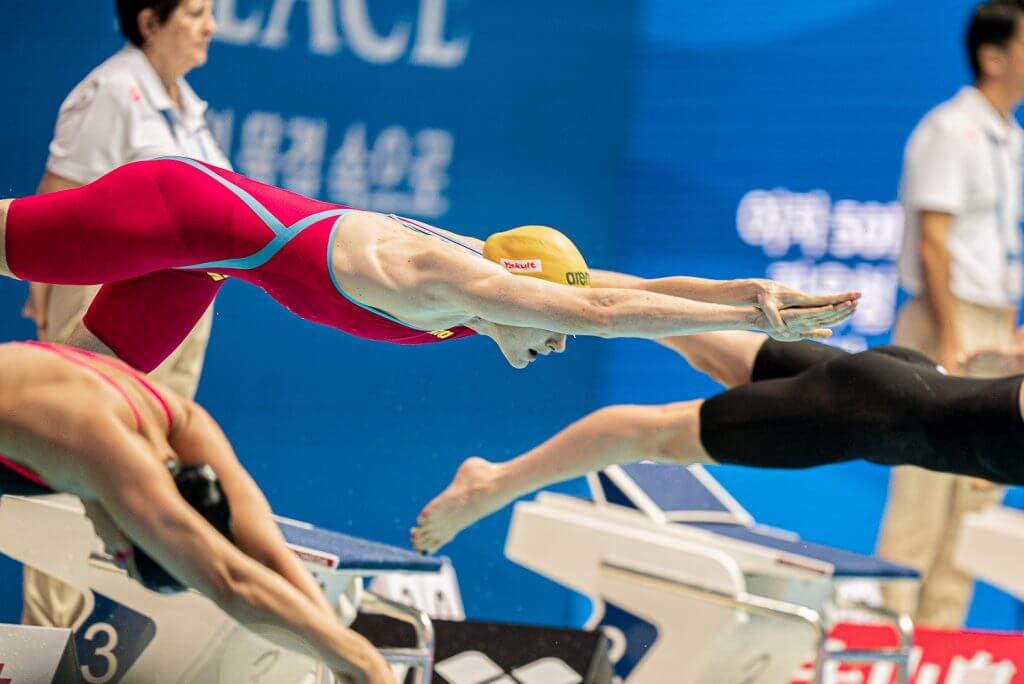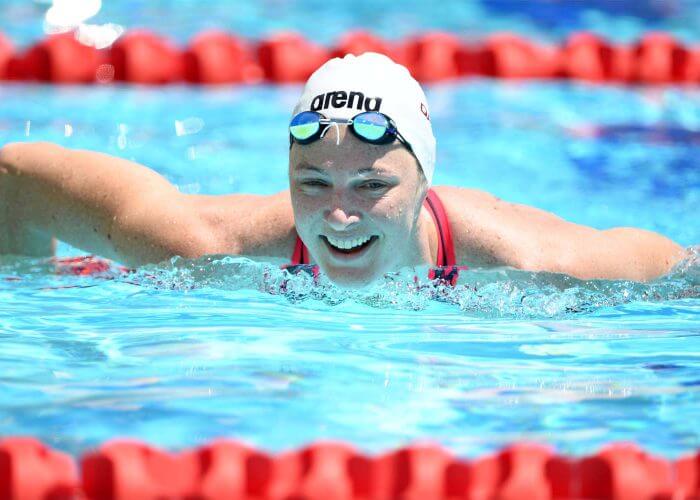Cate Campbell: ‘When Athletes Fail, We Feel It Much More Deeply Than Anyone Ever Could’

Cate Campbell, the Australian sprint ace, sent a note of support to fellow Dolphin Susie O’Neill after watching the Olympic champion of 1996 and 2000 break down in tears as she described how 200m butterfly Olympic silver in Sydney almost 20 years ago represented “failure”.
If there is one current swimmer more able than others to identify with O’Neill as the events of 19 years ago brought out the trauma and burden she carries with her yet, then the freestyle sprinter is at the front of the queue.
O’Neill arrived in Sydney not only the defending champion but the woman who the year before had finally taken down Mary T. Meagher‘s 1981 World record over 200m butterfly. O’Neill’s tears this week evoked memories of the 10th anniversary of her Sydney swims, when she told Nicole Jeffrey at The Australian that she was “still haunted” by silver in the 200m butterfly.
Cate Campbell arrived at the Rio 2016 Olympics a favourite for gold in the 100m freestyle, having crushed the World record just a month before. She emerged from the Olympic final without a medal after the weight of pressure left her well shy of her best. In response to questions about O’Neill’s emotions this week, Campbell, who started her Rio campaign with gold in world-record time with teammates in the 4x100m freestyle, revealed that she made healing a priority soon after the solo 100m final.
That race delivered one of the least expected upsets and outcomes in Olympic swimming history:
- The first tie for gold since 1984, in 52.70, an Olympic record, went to African-American Simone Manuel, the first black Olympic swimming champion among women in history, and Penny Oleksiak, at 16 and 2 months not quite the youngest 100m freestyle champion in history but the first Canadian ever to win four solo medals in the pool at a single Games (American Sandra Neilson was 16 years and 9 days when she claimed Munich 1972 gold).
- Bronze went to Sweden’s Sarah Sjostrom, whose 52.99 finish made the race the first 100m final where the medals went below 53 and whose medal made her the most decorated Swedish woman at a single Games ion the pool with one orb of each colour.
- A little over a month before that, Campbell sent shockwaves through the world sprint sorority with a 52.06 world record, the legendary Dawn Fraser on hand to celebrate with the latest pioneer of two-lap speed.
- It felt like the Rio race could not be lost. But it was, the crunch crushing: Campbell, in sixth on 53.24, had swum 11 times inside what it took to win; 25 times inside 53; 42 times faster than the best she could muster that day in Rio.
The commentary that couldn’t keep pace with the unexpected:
Three years on, speaking to Phil Lutton at The Sydney Morning Herald, Campbell said that watching O’Neill break down had been like looking in a mirror.
‘I wrote out everything that I thought other people would say about me’
In Rio, she prepared for “an onslaught of negativity from the public, media and even herself” by writing down the worst possible scenario from every quarter. She read her words over and over as a way to “desensitised myself” from the onslaught she expected. Campbell told Lutton:
“I watched my race. I wrote out everything that I thought other people would say about me, or said about me. I wrote the things I said to myself, then I wrote out all the worst things the public could say about me, then all the things Simon [Cusack, coach] could say about me. It was all there on paper and I read through it over and over again and desensitised myself to it. Otherwise, you live with that fear all the time.”
She added: “Knowing something and actually believing it are two different things. Just because you say it to yourself doesn’t always mean you believe it. I just had to accept this is what happened. From there, you can move on.”

Cate Campbell; Photo Courtesy: Delly Carr/Swimming Australia Ltd.
Cate Campbell, who will race for the London Roar when the first season of the International Swimming League gets underway next month, knew just what O’Neill was going through as she watched the 1996 Olympic 200m butterfly champion describe “failure”. That meant losing the crown to Misty Hyman in 2000 the day after causing her own upset by claiming gold in the 200m freestyle.
“To be honest, it was almost like looking in a mirror of how I felt immediately post-Rio,” Campbell told Lutton.
“What was really interesting was that the fear of watching it was worse than actually watching it [for her]. You can see the emotional scars and the pain that leaves. All of the things she had done to try and cope, I had done as well. You want to fend it off, you don’t want to face it head on. When we (athletes) fail, we feel it much more deeply than anyone ever could. I hope that people will learn to be kinder from seeing more reactions like this.”
Campbell rested from long-course and national-team racing in 2017 before making her way back to top form. She returned to the big podium at the World Championships in July this year, for a towering tally of two gold, two silver and a bronze.
That fateful day in Rio will be with her always, may feel like ‘failure’ for almost as long, but it is not who she is nor will it define her any more than silver in Sydney defined O’Neill, who ended her career with eight Olympic medals atop 24 gold, 33 silver and 10 bronze medals in Australian colours.




We all know team spirit is important in swimming. Please Vote C. Time is very short
Lynchburg Swimming
https://www.facebook.com/LynchburgSwim/
12 hrs ·
Art Contest Time! Vote for your favorite work of swimming art by commenting A, B, or C below! Winner gets a “special award” on Friday! Be sure to share! ???♂️???♀️